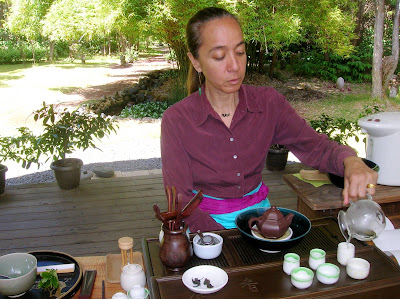
Eva Lee of Tea Hawaii, sampling some of her shade-grown teas on the big island of Hawaii.
Continuing my account of my visits to tea sites in Hawaii ...
The big island of Hawaii was not someplace I expected to find quality tea. This is origin of Kona coffee, after all. But before a vacation there with the spouse, my research into what to do to entertain ourselves kept turning up mentions of new tea farms and boutique growers (in addition to the tea ceremony demo in Honolulu I wrote about). It's not a new idea: Tea was introduced to Hawaii in 1887 but, over the years, farmers' fits and starts with the plant failed to produce a commodity-level product. Still, the Big Island's rich, volcanic soil and moody microclimates mirror many of the places where tea thrives — the slopes of China, the forests of India. Around the turn of this century, the U.S. Department of Agriculture and several state agencies gave interested tea growers in Hawaii a leg up in starting small-scale tea operations.
One of those intrepid new growers is Eva Lee. Like most of the island's new tea farmers, she does not have a background in argiculture or horticulture. She's an artist. She explained how it all started as she poured tea in her open-air studio in the jungle outside Volcano Village, just a mile or two from the steaming Kiluea Crater.
"The people behind the programs weren't as interested in turning tea into a big cash commodity for Hawaii. They wanted people who would experiment and play, develop something new and interesting," Lee said, between pours. "My husband and I knew virtually nothing about growing tea before we started. We were interested in starting something new that would have meaning to us, and we contacted Dr. Francis Zee [of the Pacific Basin Agricultural Research Center in Hilo], who was really trying to get it going here. He was skeptical, but when I mentioned that Chiu [Leong, her husband] was a potter, the door went wide open. He didn't want to turn to farmers for this, because they wouldn't take the risks artists would."
Lee walked me through the grounds around her house and studio. Her first tea plantings were out front ("the mother block"), near a makeshift koi pond. Out back, under the shade of the island jungle, she's got several dozen plants. Most were planted five to seven years ago and are just now hitting their stride. Growing in the forest, she says, "has been a huge gift. The soil is all natural, and native, and the mulch is plentiful. It's great acidic soil, thanks to the volcano."

Inside her studio — filled with shelves of Chiu's pottery and photographs — are a few tea treasures, too. She showed off an authentic Chinese rolling table, where tea leaves get rolled after withering, and a granite matcha grinder that a friend of hers backpacked out of the wilds of China tea country.
She moved gracefully through a chado ceremony for me and another guest, sampling several teas of her own and from a neighboring grower. First, a black tea by Mike Riley, a woodworker across the road, then some oolongs from her own gardens, doing business under the name Tea Hawaii. Her Mauka Black from spring 2008 is impressive — gnarled black leaves, a light liquor and hazlenutty aroma, then a very confident but level black tea taste, with a slightly herbal finish. I found later, drinking some samples I took home with me, that it's dynamite with savory foods.
To read more about Eva's efforts as well as some other tea growers I visited on the big island, with info and links to them, see this story I wrote for the Sun-Times.
Many of the Hawaii teas are still hard to come by, because they're not distributed off-island yet or because the yields simply aren't quite ready. But just this June, Florida-based Narien Teas became the first mainland retailer to offer Hawaii-grown tea. They're shipping shade-grown teas from Eliah Halpenny's Big Island Tea, another small estate just down the road from Volcano Village. So far, they've got Halpenny's limited-edition spring-harvest Kilinoe Tea, a fresh green tea, at $9 for five grams. Hawaii teas also got a brief shout-out last week in the NYTimes.
Finally, if you find yourself in Hawaii sipping caffeinated bevs, try the coffee, too. And the Kona coffee truly is great stuff, but I more highly recommend the Ka'u brew instead. It's an upstart on the island but is winning some major awards, and it's so freakin' smooth you won't believe it.



No comments:
Post a Comment